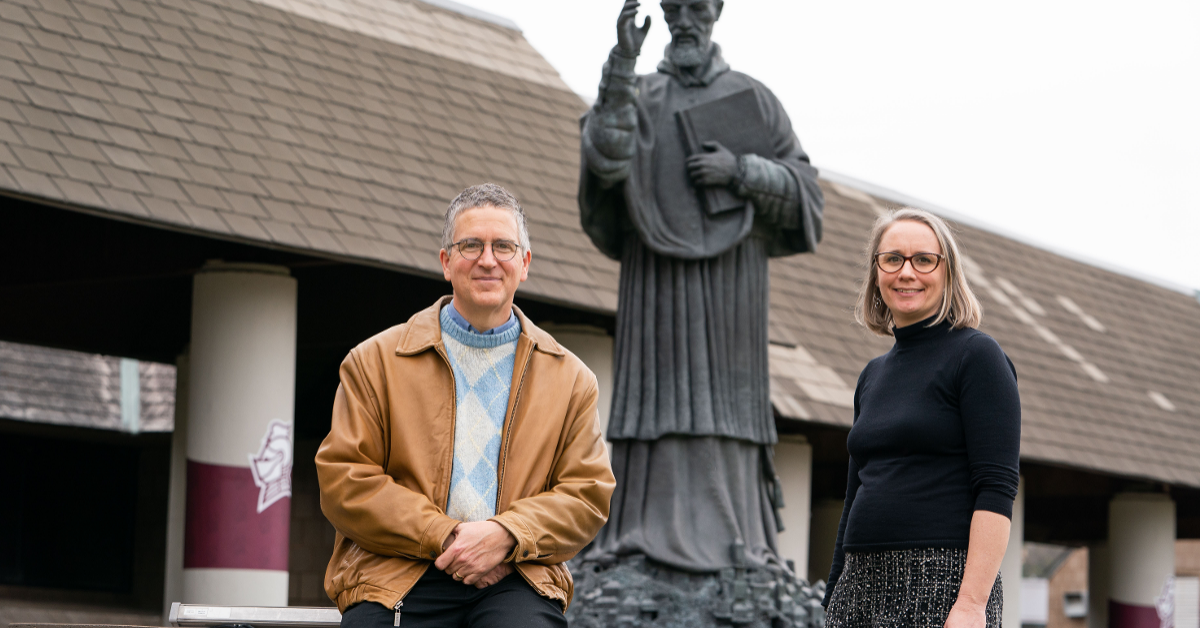
Bellarmine University will welcome several hundred Catholic high school students and their teachers in March to a half-day symposium about the compatibility of faith and science.
The Saint Albert Initiative, now in its fifth year, is organized and sponsored by the Science and Religion Initiative of the Notre Dame McGrath Institute for Church Life, with additional sponsorship from the Society of Catholic Scientists (SCS). St. Albert
the Great was a bishop, scientist and theologian and is the patron saint of natural science and scientists.
“The impetus for these St. Albert Initiatives is the great need to help those Catholic young people who are confused about how to integrate what their faith teaches with what science has discovered. Surveys show that many young people lose their
faith as a result of this,” said Stephen Barr, president of the SCS and emeritus professor of physics at the University of Delaware.
“As long ago as 1986, St. John Paul II urged Catholic scientists to help in this area. That is one way we are doing that. We hope that students come away understanding the profound harmony between the Catholic faith and modern science.”
The SCS, founded in June 2016, has more than 2,300 members in 64 countries. Members are faithful Catholics who have advanced degrees in a natural science or related field and graduate undergraduate science majors. Catholic theologians, philosophers and
historians of science are also associated with SCS.
The Saint Albert Initiative at Bellarmine will be held on March 6. Previous symposia were held in New Orleans, Philadelphia, Chicago and Washington, D.C.
“We felt that Louisville was an excellent location for the event for several reasons,” Barr said. “The Society of Catholic Scientists has an active Louisville chapter, and the Archdiocese of Louisville has had a great commitment to education
in the science-faith area at least since its Faith and Science Dialogue Group was founded in 2017 by Archbishop Kurtz. And Bellarmine University is a natural venue, since it is a Catholic university and several members of the Louisville Chapter of
SCS are faculty members there.”
One of them is Dr. Kate Bulinski, associate professor of Geosciences in the Department of Environmental Studies at Bellarmine, who spoke at the symposium in New Orleans last year and helped to bring it to Louisville. This year, she will give a talk on
“The History of Life in Deep Time.”
Other speakers will address topics such as “Modern Science, the Catholic Church and the Galileo Affair,” “Evolution and the Catholic Faith” and “The Science of the First Humans.”
Bellarmine’s Dr. Anna Christianson, associate professor of Chemistry, and Dr. Martha Carlson Mazur, professor of Environmental Studies, will participate in Ask-a-Scientist poster sessions.
Bulinski, a practicing Catholic and a paleontologist, said modern culture has embraced, and promotes, the false notion of inherent conflict between faith and science—pitting creationism against evolution, for instance.
“With the rise of misinformation and the influence of decentralized social media, it is harder than ever to discern what is true. It is no wonder that Catholics, especially young Catholics, are confused about what to think about the relationship
between faith and science,” she said. “The Saint Albert Initiative is an effective way to counteract that misinformation. It is a powerful experience to hear directly from Catholic scientists who can personally demonstrate that faith and
science are, in fact, compatible within the Catholic Church.”
“Without both science and theology, we have an incomplete picture of our greater reality and our place within it.”
Barr said surveys show that the conferences are effective. Attendees at the 2022 St. Albert Initiative gave a 94.7% score to the statement “This event helped me realize that faith and science are not in conflict,” he said.
The St. Albert Initiative is free for all attendees, and the University of Notre Dame will award participating high school teachers six hours of professional development credit.
For more information about the event, contact Dr. Kate Bulinski at kbulinski@bellarmine.edu.
Photo: Christopher Graney, an adjunct scholar at the Vatican Observatory who lives in Louisville, and Dr. Kate Bulinski will speak at the symposium.